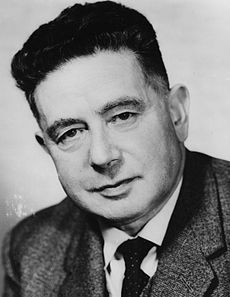- Otto Kahn-Freund
-
Sir Otto Kahn-Freund 
Sir Otto Kahn-Freund in 1950.Born 17 November 1900
Frankfurt am-mainDied 16 August 1979
OxfordCitizenship German Education Goethe-Gymnasium Alma mater Frankfurt University, London School of Economics Occupation Academic Lawyer, Judge Employer London School of Economics, Brasenose College, Oxford Religion Judaism (agnostic) Sir Otto Kahn-Freund (17 November 1900, Frankfurt am Main - 16 August 1979, Oxford) was professor of comparative law, University of Oxford, and a path breaking scholar in labour law.
Contents
Biography
Kahn-Freund was born in Frankfurt am Main of Jewish parents and educated at the Goethe-Gymnasium there and Frankfurt University. He became judge of the Berlin labour court, 1929. Dismissed by the Nazis in 1933, he fled to London and became a student at the London School of Economics. He became an assistant lecturer in law there in 1936 and professor in 1951. He was called to the bar (Middle Temple) in 1936. He became a British citizen in 1940.
He was appointed professor of comparative law, University of Oxford, and fellow of Brasenose College, Oxford in 1964 and elected FBA in 1965. He became an honorary bencher of the Middle Temple in 1969 and a QC in 1972. He was knighted in 1976.
He played an important part in the establishment of labour law as an independent area of legal study, and is credited as the doyen of British Labour Law.[1]
He laid the groundwork of a philosophical approach toward Labour Law in British scholarship, which had hitherto been characterised by empiricism. In particular, his concept of "collective laisser-faire" or collective laissez-faire was both a description of the British model of Industrial Relations in the 1960s and a normative model of how industrial relations should be. Industrial relations is conceived as tripartite, with Employers, Employees (through Trade Unions) and the State all engaged as actors. “The relation between an employer and an isolated employee or worker is typically a relation between a bearer of power and one who is not a bearer of power. In its inception it is an act of submission, in its operation it is a condition of subordination.” [2] The concept of collective laisser-faire sets out the idea that the law (and the State) are (and in his earlier work should be) abstentionist, meaning, in this context, that the state should allow capital and collective labour to negotiate freely, without extensive legislative interference unless collective representation is unlikely to yield industrial justice or stability. Philosophically, this can be contrasted with the "market individualism" approach or the "floor-of rights" approach.
He was a member of the Royal Commission on Reform of Trade Unions and Employers' Associations 1965. This became known as the Donovan Commission[3], and reported in 1968. Otto Kahn-Freund, as the senior lawyer on the commission is widely regarded [4] as having substantially written the Donovan Report published in 1968. The Donovan Report's significance in British Labour Law is hard to overstate, forming the intellectual underpinnings of both the Industrial Relations Act 1971 and the Trade Union and Labour Relations Act 1974.
Otto Kahn-Freund had a substantial and extensive influence on a generation of British Labour Lawyers, many of whom themselves passed on his influence in their own academic work, such as Bill Wedderburn, Paul Davies, Mark Freedland, Roy Lewis and Jon Clarke.
Publications
- Das soziale Ideal des Reichsarbeitsgerichts (Bensheimer, Mannheim, Berlin, Leipzig 1931)
- The law of carriage by inland transport (Stevens, London 1939)
- Beiträge zum Neuaufbau des deutschen Arbeitsrechts (Renaissance Publ., Welwyn Garden City 1944)
- The Growth of Internationalism in English Private International Law (1960)
- Die Rechtsinstitute des Privatrechts und ihre soziale Funktion (Fischer, Stuttgart 1965) with Karl Renner, translation by Elisabeth Kahn-Freund
- Delictual Liability and the Conflict of Laws (1968)
- Parallelen und Gegensätze im englischen und amerikanischen Privatrecht (Hanstein, Bonn 1970) with Viktor Weidner
- General Problems of Private International Law (1975)
- Labour and the Law (Hamlyn Trust 1972) ISBN 978-0-420-43850-8, (2nd edn Stevens 1977) ISBN: 0420452109
- Arbeit und Recht (Bund, Köln, Frankfurt am Main 1979) translation by Franz Mestitz.
- Kahn-Freund's Labour and the Law (3rd edn Stevens & Sons 1983) introduction by PL Davies and M Freedland
- Arbeitsbeziehungen (Nomos, Baden-Baden 1981)
Notes
- ^ See Lewis, 'Kahn-Freund and Labour Law: an Outline Critique' (1979) 8 Industrial Law Journal 202-221
- ^ O Kahn-Freund, Labour and the Law (1972) 8, and see also Davies and Freedland Kahn-Freund's Labour and the Law (1983) 18
- ^ [http://www.eurofound.europa.eu/emire/UNITED%20KINGDOM/DONOVANCOMMISSION196568-EN.htm EMIRE: UNITED KINGDOM - DONOVAN COMMISSION 1965-68
- ^ See in particular Lewis Op. Cit.
References
- Dictionary of National Biography
- Who was Who
- Sir Otto Kahn-Freund, Q.C., F.B.A 1900–1979 B.A.H. Ind Law J.1979; 8: 193-196 [1]
- Labour Law and Industrial Relations: Building on Kahn-Freund. by Lord Wedderburn; Roy Lewis; Jon Clark 1983 Oxford University Press and Clarendon Press. This book also reviewed by Fred Einbinder, The American Journal of International Law, Vol. 81, No. 2 (Apr., 1987), pp. 547–549 [2]
Categories:- 1900 births
- 1979 deaths
- Alumni of the London School of Economics
- British knights
- Fellows of the British Academy
- Fellows of Brasenose College, Oxford
- German Jews
- British Jews
- German refugees
- Jewish agnostics
- Jewish refugees
- German socialists
- Jews who emigrated to the United Kingdom to escape Nazism
- Organizational studies and human resource management
- Naturalised citizens of the United Kingdom
- British legal writers
- German emigrants to the United Kingdom
Wikimedia Foundation. 2010.
